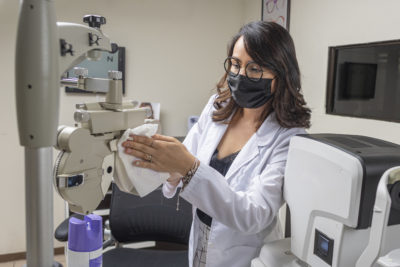Vision is known as the supreme sense among the five senses. Did you know – the visual system does not age till 13 years and retina has highest metabolism rate in human body! This makes it all the more important to nurture it. We often look out for food to make us look beautiful. Have we ever thought how food and nutrients could help our vision? Read on to know about top food nutrients which are essential for our eyes.
Vitamin A: The main function of vitamin A, a fat-soluble vitamin, is to maintain eye health. The cells responsible for vision during day and night require vitamin A for their function. It protects cornea and retina, prevents vision loss due to age related degeneration. Vitamin A also helps to reduce dryness caused by excessive screen time.
What can you include in your meal?
Vegetarian foods: Yellow & orange fruits and vegetables like drumstick leaves, amaranth (laal math), colocasia leaves (patra), shepu, carrot, sweet potato, orange pumpkin.
Non vegetarian foods: goat liver, sheep liver, chicken liver, beef liver, pork liver, eggs.
Vitamin D: Vitamin D is a fat soluble vitamin and acting antioxidant. A deficiency of vitamin D can cause stinging, redness, fatigue in eyes. Supplementation can help to reduce blurred vision and sensitivity to light. In case of eye surgery like cataract, lasik surgery; vitamin D acts as antioxidant.
What can you include in your meal?
Sunlight
Non vegetarian foods: eggs, hilsa, pork liver and kidney, chicken liver.
Vitamin E: Vitamin E is a fat soluble vitamin and an antioxidant. As an antioxidant, it protects eyes from metabolic degeneration. Supplementations are recommended after surgery.
What can you include in your meal?
Vegetarian foods: Nuts and oilseeds, kiwi, fortified foods
Non vegetarian foods: bacon, pepperoni, fortified foods
Vitamin C: Vitamin C, ascorbic acid is water soluble vitamin which is also an antioxidant. Vitamin C is essential in formation of collagen, which is found in cornea. It reduces the risk of cataract formation and is essential for destroying free radicals after surgery.
What can you include in your meal?
Vegetarian foods: amla, gooseberry, guava, orange, red & yellow bell peppers.
Vitamin B12: Vitamin B12 is a B complex water soluble vitamin. Vitamin B12 is essential for neuro signaling i.e. carry messages to-fro from brain and eyes. B12 deficiency can result in damage of optic nerve. Your daily glass of milk provides this much essential Vitamin B12.
What can you include in your meal?
Vegetarian foods : milk and milk products
Non vegetarian foods: sheep liver, goat liver, chicken liver, eggs
Lutein: Lutein is a pigment which acts as antioxidants and also filters harmful high-energy blue wavelengths of light. It helps protect and maintain healthy cells in the eyes.
What can you include in your meal?
Vegetarian foods: Drumstick leaves, agathi leaves, amaranth leaves, spinach, colocasia leaves.
Zeaxanthin: Zeaxanthin is an antioxidant which along with lutein, helps to reduce the risk of retina damage and protects eye cells. They absorb excessive sunlight and protects from blue rays released from television, laptops and screens of other gadgets.
What can you include in your meal?
Vegetarian foods: Agathi leaves, papaya, amaranth leaves, methi seeds, colocasia leaves, sweet potato.
Zinc: Zinc is a trace mineral, which carries vitamin A to eyes to produce protective pigment. Along with Vitamin A, it helps to prevent night blindness and cataract. It also helps to relieve eye irritation.
What can you include in your meal?
Vegetarian foods: pumpkin seeds, sesame seeds and nuts.
Nourishing your eyes with healthy nutrients can go a long way in maintaining good eye sight. Along with a healthy diet, regular exercise can also optimize the benefit in improved vision.









